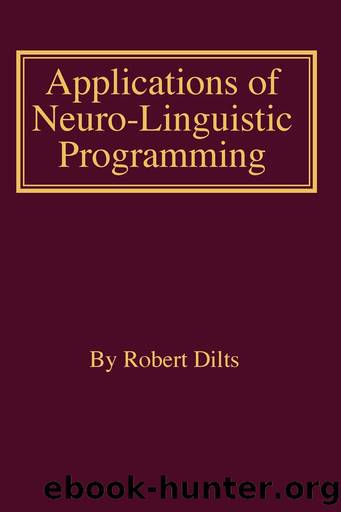Applications of NLP by Dilts Robert Brian

Author:Dilts, Robert Brian [Dilts, Robert Brian]
Language: eng
Format: epub
Publisher: Dilts Strategy Group
Published: 2018-02-28T00:00:00+00:00
Platoâs Use of the Dialectic In The Republic: A Linguistic Analysis
I. Introduction
Platoâs dialectic, a form of the Socratic method of discussion and reasoning through argument and dialogues, was described by him in The Republic as the âactivity which systematically sets about the definition of the essential nature of things. . . . Dialectic, in fact, is the only activity whose method is to challenge its own assumptions so that it may rest firmly on first principles.â Plato maintained that through the scrutinizing examination and re-examination of statements of principles and virtues, even those brought up by its own arguments, the dialectic would eventually boil the statements down to the eternal truths or 'formsâ at their base. The success of the dialectic, however, relies on the depth of the examination and the extent to which the assumptions are challenged.
The term 'modelling' applies to the way in which a person classifies, arranges and stores his experiences and perceptions in order to direct his actions. The way in which an individual organizes his own 'modelâ of the world he experiences determines the way in which past perception and experiences are recalled and how future ones are to be approached. Philosophy and politics are ideal disciplines for the manifestation of formal modelling systems on personal and on collective levels; philosophy being the study and organization of oneâs own personal experiences and politics being the attempt to transform these patterns to a community level.
Platoâs republic reflects one such model of the world and, in fact, The Republic provides for us among the first records of the conscious categorization and manipulation of a philosophical and political model.
Throughout history the great philosophers, politicians and speakers have admired and attempted to imitate Socratesâ verbal artistry. Yet, there really has never been another individual who has been able to fully capture Socratesâ powers of speech; his ability to identify the weak points in his opponentsâ arguments and assumptions; and his ability to formulate questions that so directly confront those assumptions and weak spots.
It seems that, despite its definition, the dialectic procedure was not as systematic as Plato claimed. Most people find themselves in awe of or confused by Socratesâ abilities rather than able to apply the dialectic principles to their own interactions to get to âfirst principles.â Most people are not able to really listen to what other people say and identify and challenge assumptions. Certainly this ability has not yet been made so formally explicit that anyone could be a Socrates in the same way that almost anyone can drive a car, use a gun or push a button that would detonate a nuclear explosion. Perhaps it is because of this lack that one finds it so hard to disagree with those that claim that our political systems and political thinking have not advanced much beyond that of Socratesâ timeâcertainly not as much as our technological systems and our weaponry.
Perhaps if there had been more people trained in the Socratic ability to challenge assumptions in Hitlerâs Germany the course of history would have been very different.
Download
This site does not store any files on its server. We only index and link to content provided by other sites. Please contact the content providers to delete copyright contents if any and email us, we'll remove relevant links or contents immediately.
Free Yourself from Fears by Joseph O'Connor(1443)
Neuro-linguistic Programming for Dummies by Romilla Ready & Kate Burton(1435)
Foolproof Persuasion: The Visual Guide To Influencing Others Without Ever Being Wrong by Vinh Ly(1426)
Beliefs by Robert Dilts(1348)
Moneyball by Michael Lewis(1345)
Moneyball: The Art of Winning an Unfair Game by Michael Lewis(1226)
NLP by Tom Hoobyar(1203)
NLP For Parents by Judy Bartkowiak(1170)
Forward: A Memoir by Abby Wambach(1121)
Mind Control Hypnosis by Dantalion Jones(1113)
Get Laid or Die Trying by Jeff Allen(1112)
Dark NLP: How To Use Neuro-linguistic Programming For Self Mastery, Getting What You Want, Mastering Others And To Gain An Advantage Over Anyone by Pace Michael(1095)
Neurolinguistic Programming (NLP) by Neil Shah(1084)
The Happiness Habit by Brian Colbert(1070)
Breaking Up with Busy by Yvonne Tally(1066)
Well Designed Life: 10 Lessons in Brain Science & Design Thinking for a Mindful, Healthy, & Purposeful Life by Bobinet MD MPH Kyra(1013)
Psychology: How To Effortlessly Attract, Manipulate And Read Anyone Unknowingly - Become A Master Persuader INSTANTLY by Steel Jack(992)
Transformational NLP by Carl Buchheit Ellie Schamber(968)
The PPD Learning NLP Practice Group Book: The Special Guest Sessions by Judith Lowe(913)
